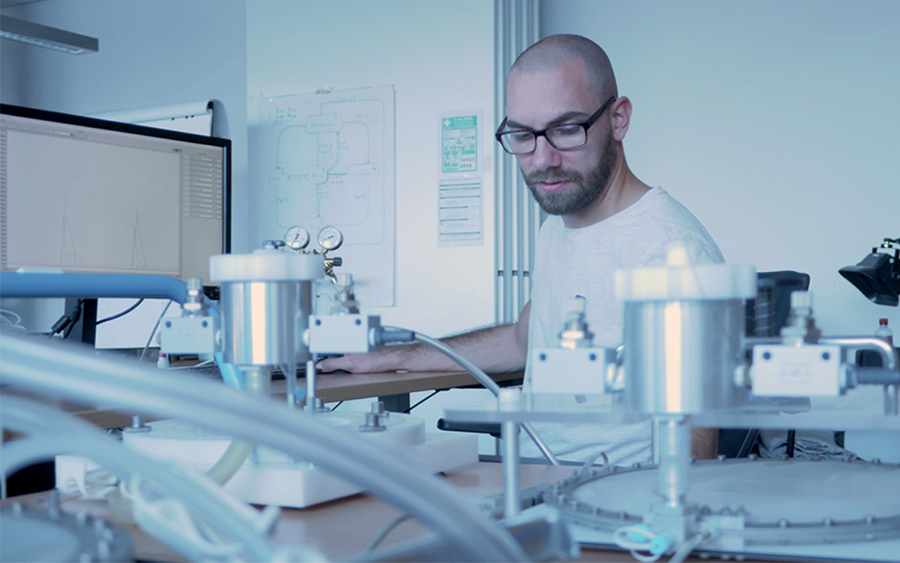Anyone who works in medical technology is working in an industry that is looking for skilled workers. German companies in particular are the European leaders. No wonder the German Federal Employment Agency wants to introduce potential occupational fields in medical technology to job seekers who are enthusiastic about medicine and technology. WOM employee René was happy to talk about his career and his professional life.
Check Technology that saves lives (only in German, translation see below).
Moreover, since Novanta also wants to continue bolstering its ranks, we are happy to let people have a look at our current job offers.
Interview text:
Technology that saves lives
Germany’s medical technology industry is the leader in Europe. In order to be able to defend its “pole position”, it is not only in research and development that specialists are desperately sought.
René Pätznick develops software for insufflators at W.O.M. World of Medicine GmbH in Berlin. These are pressure control devices that transport medical CO2 into the patient’s body during minimally invasive operations, thus enabling surgeons to perform the procedures. In concrete terms, the 31-year-old is responsible for the control technology components. This means that his software ensures that the pressure in the patient’s abdomen remains constant and that excess pressure is dissipated through valves. “I acquired the medical technology expertise pertaining to this complex product in extensive training courses. In addition, my specialist colleagues are always on hand to answer questions,” explains the software developer.
The medical vocabulary and understanding of the surgical methods involved is reinforced through learning-by-doing on dummies used to demonstrate the minimally invasive operations. René Pätznick works in an interdisciplinary team consisting of hardware and software experts as well as designers, test engineers, and quality management. “The medical technology industry is the right place for anyone who likes to work with great attention to detail. The demands with regard to quality are particularly high here,” he says.
In his bachelor’s degree program in electrical engineering at the Beuth University of Applied Sciences in Berlin, René Pätznick particularly enjoyed the field of software development. He then completed a master’s degree in technical information science at the same university. “I quickly realized that I would like to do something meaningful and help people, not just do technical work,” says the 31-year-old. So he decided to apply for a job with a medical technology company.
Unemployment rate below two percent
Medical technology from Germany is very popular worldwide and enjoys an excellent reputation: for years now, the export quota has been constant at 65 percent. According to the industry association Spectaris, the sector, which is dominated by medium-sized companies, generates annual sales of over 30 billion Euros and employs more than 200,000 people. “At 60 percent, the majority of the workforce consists of specialists. And skilled workers with further training and academics account for 28 percent,” says Claudia Suttner, a labor market expert at the Federal Employment Agency (BA). Fields of activity in the industry are medical technology itself and, for example, management, purchasing and sales or technical development and design.
New professional fields thanks to digitization
For specialists with an apprenticeship, further education or studies in a profession in medical, orthopedic and rehabilitation technology, there are also fields of application in other industries – for example in retail, health care or wholesale. In June 2019, a total of 129,000 people were employed in this occupational group subject to social insurance contributions. “They are in great demand due to the demographic shift as well as fast-paced technical developments,” says Claudia Suttner. The Federal Employment Agency received reports of 11,000 jobs in the course of 2019, and the unemployment rate is below two percent.
“The industry is worried about increasing regulation, particularly as a result of the new European Medical Device Directive,” reports Marcus Kuhlmann, Head of Medical Technology at Spectaris. “Many companies expect this to jeopardize further growth in sales and employment.” Digitization in the healthcare sector is both a challenge and an opportunity. “In the next five to ten years, new job profiles will emerge around digitization,” the association spokesperson anticipates. Another trend is the internationalization of markets, as Dr. Marc-Pierre Möll, Managing Director of the German Medical Technology Association (BVMed), explains in an interview with “abi”.
In the high-tech industry of medical technology, people with technical qualifications in the MINT disciplines are particularly in demand. “It is not only the research and development departments of medical technology companies that are desperately looking for well-qualified employees,” says Marcus Kuhlmann. Quality management and regulatory affairs, i.e., everything to do with approvals, are also becoming increasingly important.
